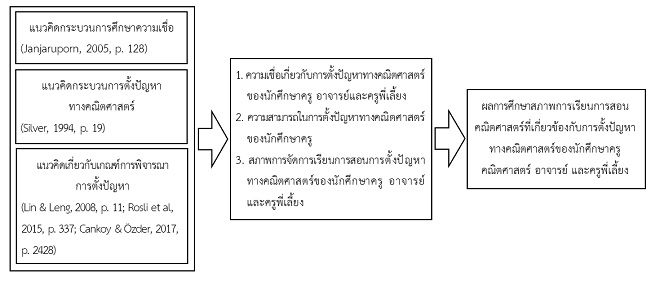THE STATUS OF MATHEMATICS INSTRUCTION RELATED TO MATHEMATICS PROBLEM POSING FOR THE PRE-SERVICE TEACHERS, LECTURERS, AND MENTOR TEACHERS IN MATHEMATICS
DOI:
https://doi.org/10.14456/nrru-rdi.2022.13Keywords:
The status of mathematics instruction, Mathematics problem posing, Belief related to mathematics problem posing, Pre-service teachersAbstract
This study aims to investigate the status of mathematics instruction related to mathematics problem by focusing on: 1) the belief related to mathematics problem posing., 2) the ability of mathematics problem posing., and 3) the status of teaching and learning of the pre-service teachers, lecturers and mentor teachers. Samples were selected by purposive sampling method consisted of 45 second-semester pre-service teachers, 5 lecturers from the Bachelor of Education Program in Mathematics, Faculty of Education, Suratthani Rajabhat University, and 15 mentor teachers of 2018 academic year. The research instruments composed of: 1) the belief questionnaire related to mathematics problem posing, 2) the mathematical problem posing test, and 3) the interview forms on mathematics problem-posing instruction. Data were collected using questionnaire, test and interview forms which were passed the quality consideration by 3 experts (0.67≤ ≤1.00). The statistical data used were percentage, mean standard deviation and content analysis. The study showed that: 1) the belief related to mathematics problem posing of the pre-service teachers, lecturers and mentor teachers was good, 2) the problem-posing context was not dissimilar to the given problems, the language used was unclear, the problem-solving process was unsystematic, only one strategy was used to solve each problem, and the posed situation conditions were unrealistic, and 3) the pre-service teachers, lecturers and mentor teachers have misconceptions about and have little experiences in mathematics problem posing.
References
Brown, S. I., & Walter, M. I. (1993). Problem Posing: reflections and application. Hillsdale, N. J. : Lawrence Erlbaum.
Cankoy, O., & Özder, H. (2017). Generalizability Theory Research on Developing a Scoring Rubric to Assess Primary School Students' Problem Posing Skills. EURASIA Journal of Mathematics, Science & Technology Education, 13(6), 2423-2439.
Chaichumkhun, J. (2019). A talk on teacher’s responsibility and inequality at school with Attapol Prapasanobol. Retrieved July 11, 2020, from https://thematter.co/social/burden-on-teachers/87255 (In Thai)
Janjaruporn, R. (2005). The Development of a Problem-Solving Instructional Program to Develop Preservice Teachers’ Competence in Solving Mathematical Problems and Their Beliefs Related to Problem Solving. Dissertation, Doctor of Education Program in Mathematics Education, Srinakarinwirot University, Bangkok. (In Thai)
Lin, K. M., & Leng, L. W. (2008). Using problem-posing as an assessment tool. In 10th Asia-Pacific Conference on Giftedness, Singapore (pp. 1-15).
National Council of Teachers of Mathematics (NCTM). (2006). Curriculum focal points for prekindergarten through grade 8 mathematics: a quest for coherence. Reston, VA : NCTM.
Office of the Education Council. (2015). The Status of Teacher Production and Development in Thailand. Bangkok : Prikwan Graphic. (In Thai)
Panichakul, I. (2014). Dear Teacher, When will you be free to teach me?. Retrieved July 25, 2020, from https://www.posttoday.com/politic/report/301573 (In Thai)
Rosli, R., Capraro, M. M., Goldsby, D., y Gonzalez, E. G., Onwuegbuzie, A. J., & Capraro, R. M. (2015). Middle-grade preservice teachers’ mathematical problem solving and problem posing. In Mathematical problem posing (pp. 333-354). New York, NY : Springer.
Silver, E. A. (1994). On Mathematical Problem Posing. For the Learning of Mathematics, 14(1), 19-28.
Silver, E. A., Mamona-Downs, J., Leung, S. S., & Kenney, P. A. (1996). Posing Mathematical Problems: An Exploratory Study. Journal for Research in Mathematics Education, 27(3), 293-309.
Supnithi, P. (2016). Being a university lecturer in the new era and the hidden responsibilities and duties. Retrieved July 5, 2020, from https://www.matichon.co.th/columnists/news_366443 (In Thai)
The Institute for the Promotion of Teaching Science and Technology. (2012). Measurement and Evaluation in Mathematics. Bangkok : V. Print (1991) Company Limited. (In Thai)
The Institute for the Promotion of Teaching Science and Technology. (2013). Preliminary Data Analysis Report: PISA 2012 Project. Retrieved May 25, 2020, from https://pisathailand. ipst.ac.th/pisa-2012-basic-research/ (In Thai)
Vangmeejongmee, C. (2017). Competency of Thai Teacher in 21st Century : Wind of Change. Journal of Intelligence, 12(2), 47-63. (In Thai)

Downloads
Published
How to Cite
Issue
Section
License

This work is licensed under a Creative Commons Attribution-NonCommercial-NoDerivatives 4.0 International License.




